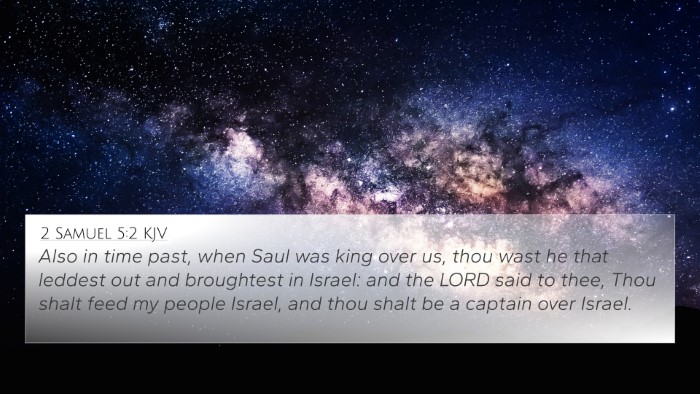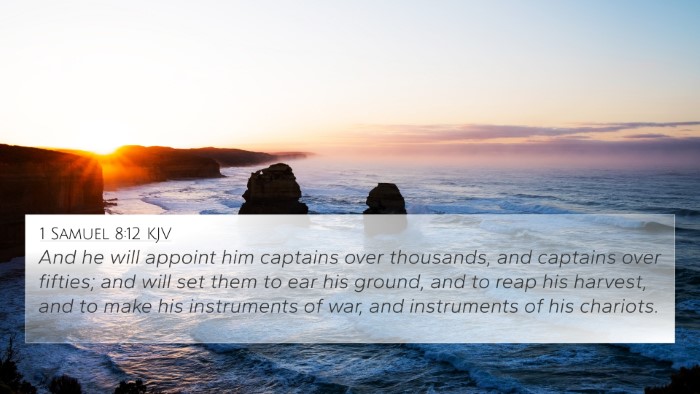Understanding 1 Samuel 18:13
Verse: 1 Samuel 18:13 – "Wherefore Saul sent him away from him, and made him his captain over a thousand; and he went out and came in before the people."
Contextual Overview
This verse occurs in a pivotal moment in the book of 1 Samuel, during the early reign of King Saul and the rise of David as a leader. David had gained great favor among the people and was becoming a prominent figure due to his military successes. This moment marks a significant turning point in Saul’s perception of David.
Commentary Insights
Matthew Henry Commentary
Matthew Henry emphasizes that Saul's decision to make David a captain over a thousand indicates a shift in Saul’s attitude towards David. Initially, Saul viewed David with admiration; however, as David’s popularity grew, Saul’s jealousy began to surface. Henry notes that Saul’s sending David away not only shows his apprehension but also highlights the importance of leadership roles in the kingdom.
Albert Barnes Commentary
Albert Barnes interprets this action by Saul as a calculated move to manage David’s rising influence. By granting him a military position, Saul could potentially keep David under surveillance. Barnes asserts that this demonstrates the precariousness of Saul's leadership, as he fears losing power to someone who once served him faithfully.
Adam Clarke Commentary
Adam Clarke provides insight into David's character as well. He explains that David conducted himself with integrity in his new role and continued to serve the people faithfully. Clarke suggests that this behavior only increased David’s popularity further, cementing the underlying tensions between him and Saul.
Key Themes and Messages
The radical change in Saul’s treatment of David reflects the broader themes of jealousy, leadership, and the divine favor upon David. This verse addresses how quickly relationships can shift, especially when intertwined with power dynamics. It serves as a cautionary tale about how insecurity can corrupt the heart of a leader.
Cross-References for Deeper Understanding
- 1 Samuel 16:13-14: The anointing of David as king showcases God's choice, contrasting Saul's diminishing reign.
- 1 Samuel 18:1-5: The bond between David and Jonathan, revealing loyalty amid discontent.
- 1 Samuel 19:1-2: Saul's intent to kill David illustrates the growing conflict between them.
- Psalm 78:70-72: Reflects on David's character and leadership qualities as a shepherd for Israel.
- 1 Chronicles 11:6: Highlights David's might as a military leader that aligns with the context here.
- Acts 13:22: Reaffirms David's heart for God, contrasting with Saul's failures.
- 1 Samuel 15:26: God's rejection of Saul as king sets the stage for David's rise in status.
Application and Reflection
This passage encourages readers to reflect on the nature of leadership and the responsibility that comes with it. The jealousy and fear seen in Saul serve as a reminder of how insecurity can lead leaders to make unwise choices. Furthermore, it depicts the importance of humility and integrity in positions of power as demonstrated by David’s faithful service despite Saul’s growing hostility.
Connections with Other Scriptures
The theme of rivalry and leadership can be further explored through various passages that explore jealousy, truth, and divine favor across the scriptures. For example:
- Genesis 37:18-20: The jealousy of Joseph's brothers parallels Saul’s envy of David.
- Luke 22:24-27: Teaching on servant leadership from Jesus shows the contrast to Saul's kingly approach.
- James 3:16: Jealousy leads to disorder, reflecting the outcomes of Saul's jealousy towards David.
- Philippians 2:3: Paul advises believers to consider others above themselves, contrasting Saul's attitude.
- John 15:18-19: Jesus speaks on the world's hatred towards those chosen by God - a theme relevant to David’s experience.
Exploring the Broader Theological Implications
The narrative of David's rise amid Saul’s decline serves as a profound exploration of God's sovereignty. This situation lays the groundwork for understanding the transition from the Old Testament kingship to the divine kingship seen in the New Testament through Christ. It invites us to examine how God orchestrates events to fulfill divine purposes, illustrating His control over human affairs.
Conclusion
As we delve deeper into 1 Samuel 18:13, we uncover a rich tapestry of human emotions, leadership challenges, and divine purpose. The connections between various biblical passages enhance our understanding of this verse and significantly contribute to the overarching narrative of Scripture. In studying these themes and cross-references, we grow in our understanding of both the Old and New Testament’s messages regarding jealousy, leadership, and the faithful response to God’s calling.
This exploration serves as both a guide for personal reflection and an invitation to engage in deeper Biblical study, utilizing cross-referencing as a powerful tool for understanding Scripture comprehensively.









